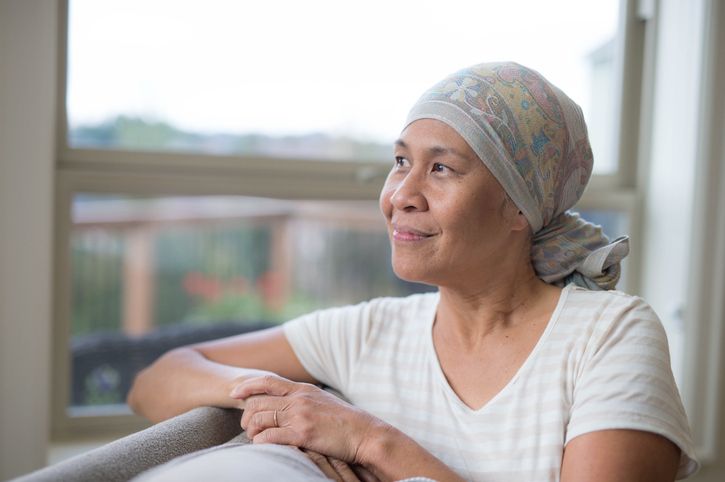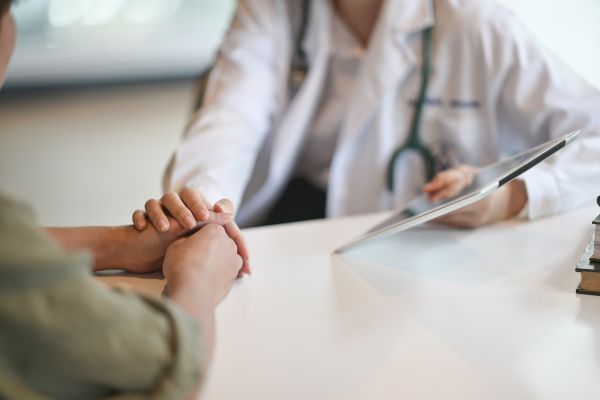When drug therapy kills cancer cells, it may affect healthy cells as well. These healthy cells are likely to repair themselves after treatment ends but you may have side effects during treatment. Side effects will vary, depending on the drugs used and your general health before treatment.
Knowing the common side effects of your drug regimen, including chemotherapy, immunotherapy and hormone therapy, can help make the process a little easier. Roswell Park doctors, nurses, and advanced practice providers (APPs) such as nurse practitioners (NPs) and physician assistants (PAs), are ready to lend a hand. They will discuss your treatment options and their risks and benefits, as well as help you navigate the process and make you as comfortable as possible.
Learning about your drug regimen
In 2020, Roswell Park began a new way of helping patients prepare for their drug therapy. The Chemotherapy Education Pathway is designed to lessen the stress of chemotherapy education and make the teaching process more effective. The program includes a 1 on 1 visit with a clinical pharmacist or oncology nurse to review your drug regimen, including how it will be given and what side effects you might experience. The program also includes Roswell Park’s book, Taking the Lead, which offers wellness tips, strategies for managing side effects, and instructions for when to call your doctor. (También disponible en español).
The Resource Center is an important stop where you can have a chemotherapy orientation that covers what to expect in the infusion center, and how to connect with the support services and resources available at Roswell Park, locally and nationally. You can also watch our Chemotherapy Orientation videos on YouTube:
- Chemotherapy Orientation: Overview. Take a look at the Infusion Center and know what to expect on your first visit
- Chemotherapy Orientation: Meet Your Team
- Chemotherapy Orientation: Resource Center. Learn about the Resource Center and its programs, including your chemo kit.
- Chemotherapy Orientation: Why the Wait? Explains what happens between the time you arrive and the time you receive your infusion.
- Chemotherapy Orientation: Support. Helpful tips on relaxation, meditation and more.
These materials are for those having IV drug therapy. If you will be taking your drug therapy by mouth, you will receive information about our specialty pharmacy and instructions on how to take and handle these powerful medications. You can also find information on drug therapy in the Patient Education Library in your Patient Portal or the Patient Education Library on the Roswell website.
During your treatment
Our goal is to help you feel as comfortable as possible throughout your treatment. Both the Buffalo and the Amherst Chemotherapy & Infusion Centers have recliners with TVs as well as newspapers, blankets and light refreshments. The centers are staffed with highly skilled nurses who have received special training in administering these medications. If you have any questions or concerns, please ask your nurses, and follow these general guidelines:
- Dress warmly or bring layers for treatment days. You may feel cold after receiving IV fluids, and infusions can take several minutes or as long as 10 hours.
- Take care of yourself. Get enough rest and sleep, maintain good nutrition, and exercise if you feel up to it. Our clinical dietitians can help if your appetite is affected during treatment.
- Inform your doctor or nurse of any side effects, such as trouble eating, drinking, or swallowing; nausea, vomiting, diarrhea, or constipation, or if you feel you are having an allergic reaction such as a rash, itching, hives, palpitations, dizziness or swelling, or tingling in your mouth or throat.
- Avoid all tobacco products and alcohol.
- Avoid spicy, hot, or acidic foods; they can cause nausea.
- Drink plenty of water. Aim for 2 to 3 liters a day unless your doctor restricts your fluids.
- Care for your mouth. Brush teeth gently and avoid mouthwash that contains alcohol.
- Care for your skin. Check with your doctor before putting anything on a rash. Avoid the sun and when outdoors, use SPF 30+ sunscreen, and wear a hat, long-sleeve shirt and long pants. Don’t use tanning beds.
- Follow the instructions provided to you for your care at home, reducing the risk of infection, and protecting those around you.
Seek and accept support
Talking with someone who has lived with cancer can be comforting and can reduce the sense of anxiety and isolation that a cancer diagnosis may bring. Some of the options Roswell Park provides include:
- The Roswell Park Community is a safe and secure online forum for sharing ideas, experiences and concerns with others. This free service is easy to join — all you need is an email address.
- Cancer Coach program matches newly diagnosed patients with a cancer survivor who understands their journey.
- Support Groups offer social and emotional support, which can improve healing and help you feel better. Some groups are cancer-specific (bladder, breast, lung, myeloma, leukemia, prostate) or focus on a specific population, such as survivors, caregivers, kids, young adults, widows/widowers, or patients who undergo transplant or have an ostomy.
- Look Good…Feel Better program helps cancer patients cope with appearance-related effects of their treatment by offering skin, hair and nail care tips; make-up techniques; and wig, scarf, hat, and turban demonstrations.
Keep your eyes on the prize
Not everyone experiences side effects during drug therapy and many are able to continue with regular or modified routines. Keeping close to your daily schedule may help distract from discomfort. You may find it useful to make a list before you begin treatment, so that you can remind yourself of activities or people that help you feel better. Whether it’s getting lost in a good book, watching a funny favorite movie, listening to music, or talking to a trusted friend, make yourself a priority during this time. Focus on your healing and remember that this is a short-term part of a long-term journey to a healthier time in your life.


